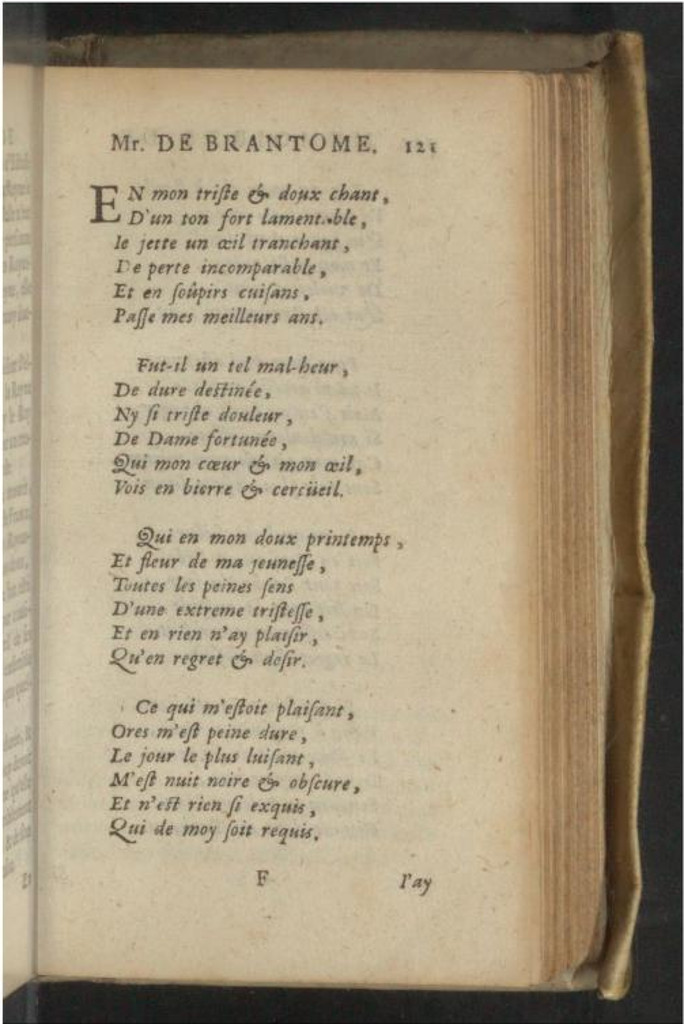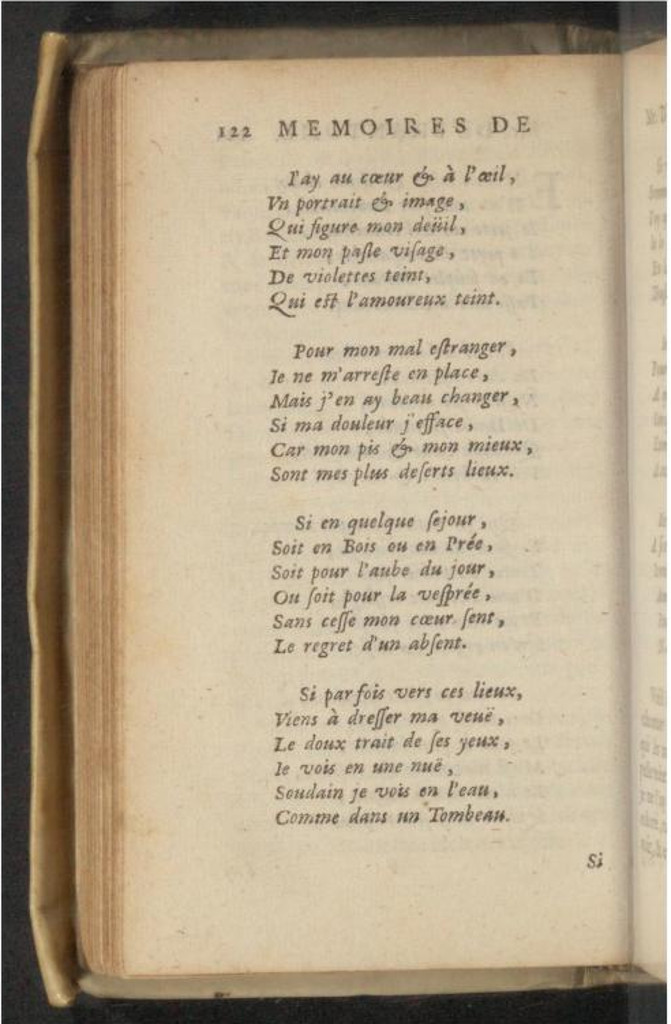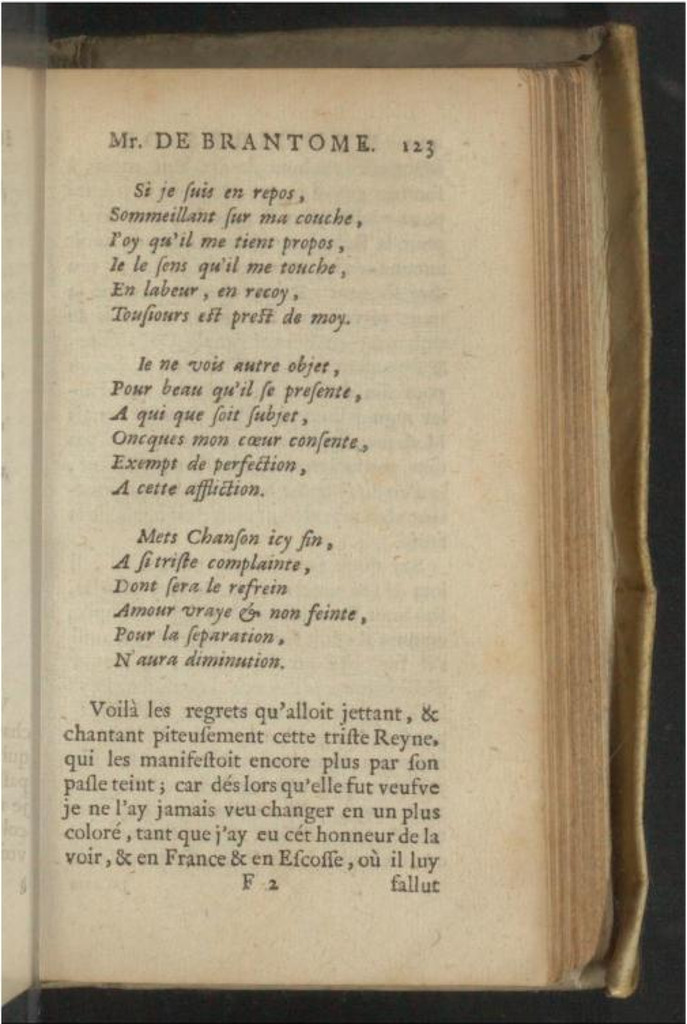| Images |
Transcription |
Translation |

|
En mon triste et doux chant,
D'un ton fort lamentable,
Je jette un deuil tranchant,
De perte incomparable,
Et en soupirs cuisans,
Passe mes meilleurs ans.
Fut-il un tel malheur
De dure destinée,
N'y si triste douleur
De dame fortunée,
Qui mon coeur et mon oeil
Vois en bierre et cercueil,
Qui en mon doux printemps
Et fleur de ma jeunesse
Toutes les peines sens
D'une extresme tristesse,
Et en rien n'ayplaisir
Qu'en regret et desir?
Ce qui m'estoit plaisant
Ores m'est peinedure;
Le jour le plus luisant
M'est nuit noire et obscure.
Et n'est rien si exquis
Qui de moy soit requis.
|
In my sad and sweet song,
With its powerful and pitiful tone,
I project a biting lament
Of incomparable loss,
And in my bitter sighs,
Live out my best years.
Was there such a tragedy
Of fated harshness,
Or such doleful sorrow
For a well-to-do lady
Than what my heart and my eye
See on the bier and in the coffin
That in my sweet Spring
And flower of my youth,
All the pains experienced
Due to an extreme grief,
And having no pleasure
Only regret and longing?
What was pleasing to me,
Now is hard and distressing;
The most brilliant day
Is night for me, black and sombre.
And nothing, however exquisite
It may be, is of any value to me.
|

|
J'ay an coeur et à l'oeil
Un portrait et image
Qui figure mon deuil
Et mon pasle visage,
De violettes teint,
Qui estl'amoureux teint.
Pour mon mal estranger
Je ne m'arreste en place;
Mais j'en ay beau changer,
Si ma douleur n'efface;
Car mon pis et mon mieux
Sont les plus deserts lieux.
Si en quelque séjour,
Soiten bois ou en prée.
Soit sur l'aube du jour,
On soit sur la vesprée,
Sans cesse mon coeur sent
Le regret d'un absent.
Si parfois vers ces lieux
Viens à dresser ma veue,
Le doux traict de ses yeux
Je vois en une nue;
Ou bien je le vois en l'eau,
Comme dans un Tombeau.
|
I have in my heart and in my mind's eye
A portrait and a likeness
Which represents my mourning,
And my pallid face is
Stained with violets,
Which is the lover's colour.
Like a vagabond,
I can't stop in one place,
But I need to alter
If my woe is to be lessened.
For my worst and my best
Are my most lonely places
If on some outing,
Be it in the woods or meadow,
At the dawning of the day
Or in the evening,
Constantly in my heart I feel
Regret for the absent one.
If sometimes, towards the heavens
My attention is directed,
The soft features of his eyes
I see in a cloud,
Or else I see them in water
As in a sepulchre.
|

|
Si je suis en repos
Sommeillant sur ma couche,
J'oyqu'il me tient propos,
Je le sens qui me touche:
En labeur, en recoy
Tousjours est près de moy.
Je ne vois autre object,
Pour beau qu'il présente
A qui que soit subject,
Oncques mon coeur consente,
Exempt de perfection
A cette affection.
Mets, chanson, icy fin
A si triste complainte,
Dont sera le refrein:
Amour vraye et non feinte
Pour la separation
N'aura diminution.[9]
|
If I am resting,
Dozing on my bed,
I hear him converse with me,
I sense that he touches me;
At work, recreation,
Always he is near me.
I see no other object
As beautiful as he,
Whatever the subject
Ever my heart consents,
Lacking perfection
To this affection.
Here my song ends,
Such a sad lament,
Whose refrain will be
Love true and unfeigned
By separation
Will never be diminished.
|